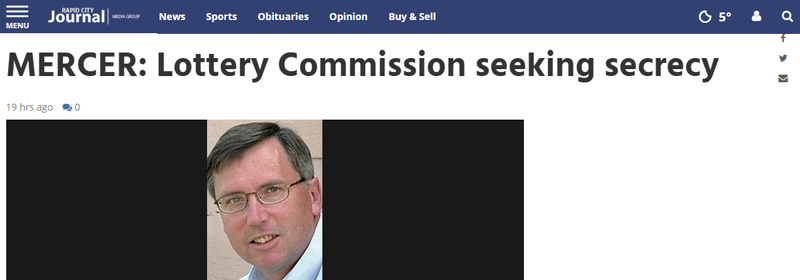Gov. Dennis Daugaard assigned Lt. Gov. Matt Michels to look through state government’s processes for ways to deter corruption in the future.
That should be important. We’ve had one scandal after another come to light the past few years with EB-5, the Gant-era mismanagement of the secretary of state’s office, and the financial probe of GEAR UP.
Michels is a lawyer and a former legislator from Yankton who served two terms as House speaker. His focus will be on state government’s relationships with contractors, whether they are businesses or non-profits.
At the same time, here’s what isn’t a good development. There is legislation for the South Dakota Lottery Commission that mostly deals with video lottery but has a dangerous loophole buried at its end.
The commission has never convinced the Legislature to let it raise the $2 bet limit and allow more than 10 gambling terminals per establishment. Under the theory of try and try and try again, the legislation asks lawmakers to let the commission make those decisions in the future.
That’s a policy decision. But the legislation also proposes giving the commissioners an additional reason to go into executive session any time they want. It says:
“Discussing business strategies, marketing strategies, pricing strategies, or financial matters, if public discussion may be harmful to the competitive position of a licensee, an applicant, or the lottery.”
The commission works for us, the people of South Dakota, but could operate its meetings entirely behind closed doors, without us. Technically, the measure comes from the Department of Revenue. The lottery operates as part of the department.
A week or so ago, Revenue Secretary Andy Gerlach left a telephone message for me. He then spoke to me at the commission meeting Jan. 7. He said there would be legislation attempting to let the commission run video lottery more like a business. He didn’t mention any secrecy provision.
The department pre-filed the legislation, House Bill 1048.
That’s when I saw the “may be harmful” secrecy provision. I wrote a blog post about it. Secretary Gerlach sent an email to me stating that’s not their intent.
One of the responsibilities that falls upon news reporters and their employers is defending the public’s ability to know about their governments’ actions and to know about their governments’ meetings.
This is one of those times.
On Wednesday, I got a call from the commission’s chairman, Chuck Turbiville, a former legislator who’s running for election again. He is mayor of Deadwood and previously was head of the Deadwood Gaming Association.
I waited until Thursday to call him back. I didn’t want to face questions about the call, just in case I somehow won the one in 292 million Powerball drawing Wednesday night.
When we did speak, Turbiville said he couldn’t recall the commission going into executive session during his two years on it. One question I asked in return was when had the commission publicly voted to pursue the legislation? He didn’t recall. I couldn’t either.
That sort of said it all.
Mentions
Litigation Cases
States
- South Dakota
Videos





Subscribe for News
Site Digest
Join Professionals on EB5Projects.com →
Securities Disclaimer
This website is for informational purposes only and does not constitute an offer or solicitation to sell shares or securities. Any such offer or solicitation will be made only by means of an investment's confidential Offering Memorandum and in accordance with the terms of all applicable securities and other laws. This website does not constitute or form part of, and should not be construed as, any offer for sale or subscription of, or any invitation to offer to buy or subscribe for, any securities, nor should it or any part of it form the basis of, or be relied on in any connection with, any contract or commitment whatsoever. EB5Projects.com LLC and its affiliates expressly disclaim any and all responsibility for any direct or consequential loss or damage of any kind whatsoever arising directly or indirectly from: (i) reliance on any information contained in the website, (ii) any error, omission or inaccuracy in any such information or (iii) any action resulting therefrom.



